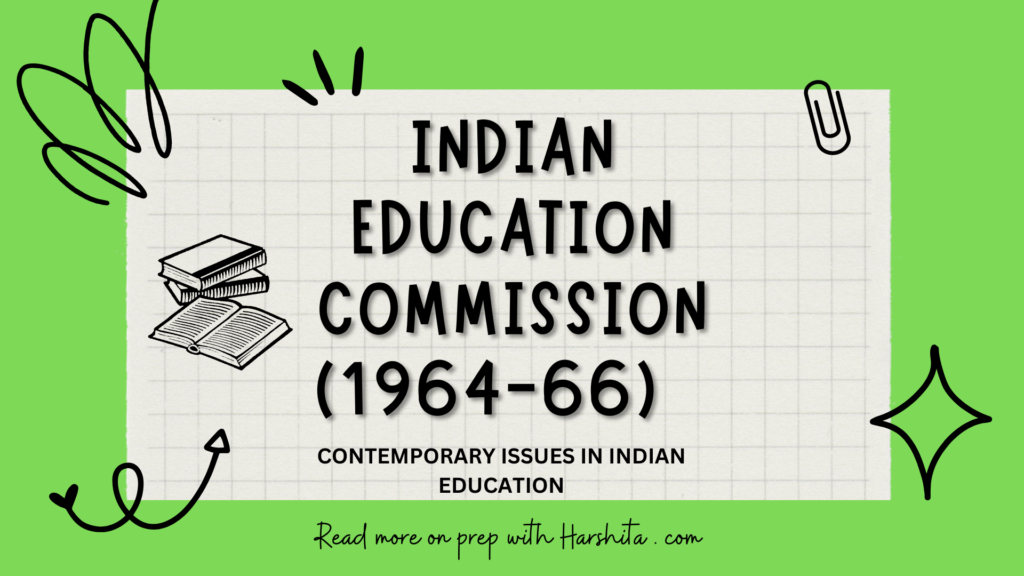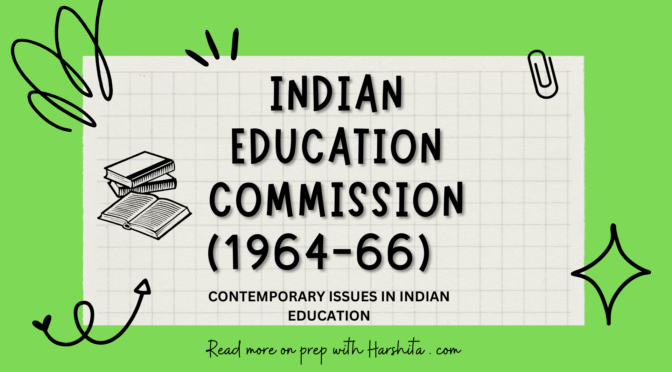The Indian Education Commission, also known as the Kothari Commission, was established in 1964 by the Government of India to assess the state of education in the country and recommend comprehensive reforms.
Here are more details about the Indian Education Commission (1964-66):
- Formation and Composition: The commission was established under the chairmanship of renowned educationist Daulat Singh Kothari. It consisted of 17 members, including educationists, administrators, and experts from various fields.
- Objectives: The primary objectives of the commission were to:a. Assess the overall state of education in India, including primary, secondary, and higher education. b. Identify the challenges and deficiencies in the education system. c. Make recommendations to improve the quality, relevance, and accessibility of education. d. Address issues related to educational planning, administration, curriculum, teacher training, and educational finance. e. Examine the relationship between education and national development.
- Scope: The commission had a broad mandate and examined various aspects of education, including primary education, secondary education, vocational education, teacher education, curriculum, examination systems, and educational planning.
- Research and Consultations: The commission conducted extensive research, collected data, and analyzed educational practices and policies. It also sought the opinions and suggestions of experts, educators, administrators, and the public through consultations, surveys, and submissions.
- Report: The commission submitted its report, titled “Education and National Development,” in 1966. The report was comprehensive, presenting a detailed analysis of the education system in India and proposing recommendations for its transformation.
- Key Recommendations: The Kothari Commission made several significant recommendations, some of which include:
a. Universal Education: The commission emphasized the importance of providing free and compulsory education to all children up to a certain age. It advocated for the establishment of a common school system to ensure equal educational opportunities for all.
b. Integrated Education: The commission recommended the integration of general education with vocational education to cater to the diverse needs and aspirations of students. It stressed the need for a curriculum that combines academic knowledge with practical skills.
c. Educational Planning: The commission emphasized the importance of comprehensive educational planning to address the expansion, quality improvement, and resource allocation in the education sector. It recommended the establishment of educational planning bodies at the national, state, and district levels.
d. Teacher Education and Training: The commission highlighted the need for quality teacher education and training programs. It proposed the establishment of teacher training institutions, the revision of teacher education curricula, and the introduction of in-service training programs.
e. Curriculum Reforms: The commission recommended a flexible and learner-centric curriculum that promotes critical thinking, creativity, and problem-solving skills. It emphasized the importance of a curriculum that is relevant to the needs of society and responsive to social change.
f. Examination Reforms: The commission suggested reforms in the examination system to reduce the emphasis on rote learning and encourage a comprehensive evaluation of student’s abilities and understanding. - Impact: The recommendations of the Kothari Commission had a profound impact on the education system in India. Many of its recommendations were incorporated into policies and reforms, leading to significant changes in educational planning, curriculum development, teacher training, and the expansion of educational opportunities.
The Indian Education Commission (1964-66) played a pivotal role in shaping the educational landscape of India. Its comprehensive analysis and recommendations laid the foundation for subsequent educational reforms, focusing on universal education, curriculum reforms, teacher training, and holistic development of students.
Also Read: Common School system

Also Visit: Prep with Harshita



